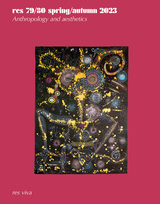19 start with C start with C
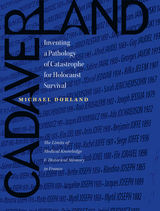

Since the 1970s health care costs in the United States have doubled, insurance premiums have far outpaced inflation, and the numbers of the uninsured and underinsured are increasing at an alarming rate. At the same time the public expects better health care and access to the latest treatment technologies. Governments, desperate to contain ballooning costs, often see a market-based approach to health care as the solution; critics of market systems argue that government regulation is necessary to secure accessible care for all.
The Catholic Church generally questions the market's ability to satisfy the many human needs intrinsic to any care delivery system yet, although the Church views health care as a basic human right, it has yet to offer strategies for how such a right can be guaranteed. Mary J. McDonough, a former Legal Aid lawyer for medical cases, understands the advantages and disadvantages of market-based care and offers insight and solutions in Can a Health Care Market Be Moral?
Drawing on Catholic social teachings from St. Augustine to Pope John Paul II, McDonough reviews health system successes and failures from around the world and assesses market approaches to health care as proposed by leading economists such as Milton Friedman, Regina Herzlinger, Mark Pauly, and Alain Enthoven. Balancing aspects of these proposals with Daniel Callahan's value-dimension approach, McDonough offers a Catholic vision of health care in the United States that allows for some market mechanisms while promoting justice and concern for the least advantaged.
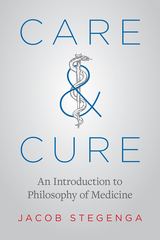
The fourteen chapters in Care and Cure present and discuss conceptual, metaphysical, epistemological, and political questions that arise in medicine, buttressed with lively illustrative examples ranging from debates over the true nature of disease to the effectiveness of medical interventions and homeopathy. Poised to be the standard sourcebook for anyone seeking a comprehensive overview of the canonical concepts, current state, and cutting edge of this vital field, this concise introduction will be an indispensable resource for students and scholars of medicine and philosophy.
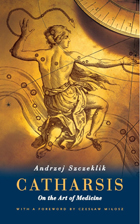
The process of diagnosis, for instance, belongs to a world of magic and metaphor; the physician must embrace it like a poem or painting, with particular alertness and keen receptivity. Speculation on ways to slow aging through genetics, meanwhile, draws directly on the dream of immortality that artists and poets have nourished through the ages. And the concept of catharsis itself has made its way from the writings of Aristotle to today's growing interest in the benefits of music to health, especially in newborns. As Szczeklik explores such subjects as the mysteries of the heart rhythm, the secret history of pain relief, the enigmatic logic of epidemics, near-death or out-of-body experiences, and many more, he skillfully weaves together classical literature, the history of medicine, and moving anecdotes from his own clinical experiences. The result is a life-affirming book that will enrich the healing work of patients and doctors alike and make an invaluable contribution to our still-expanding vision of the art of medicine.

Cattle, Priests, and Progress in Medicine was first published in 1978. Minnesota Archive Editions uses digital technology to make long-unavailable books once again accessible, and are published unaltered from the original University of Minnesota Press editions.
The author shows that over the centuries many of the most significant breakthroughs in improving humans health have been closely associated with observations and experiments on animals other than man. Because human medical progress has been so dependent on veterinary studies, he urges that schools of veterinary medicine assume a much greater role in the training of persons for research in human medicine.
To illuminate the historical link between animals and man in medical progress, Professor Schwabe recounts highlights in the history of medicine from ancient times onward. He describes the early history of man in terms of animal cultures, focusing on the prehistoric Nile Valley, and points to similarities in medical knowledge between present-day "cattle" societies in Northeastern Africa and the ancient people of the Nile. He discusses the comparative healers of ancient Egypt, the comparative foundations of Greek medicine, the Arabic contribution, Sicily and the beginnings of modern medicine, and subsequent developments through the Renaissance .Bringing the history down to modern times, Professor Schwabe emphasizes the role of veterinary medicine in medical research. He outlines specific reforms in the curricula of schools and colleges of veterinary medicine which would provide for the education of medical investigators.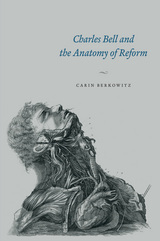
In Charles Bell and the Anatomy of Reform, Carin Berkowitz takes readers into Bell’s world, helping us understand the life of medicine before the modern separation of classroom, laboratory, and clinic. Through Bell’s story, we witness the age when modern medical science, with its practical universities, set curricula, and medical professionals, was born.
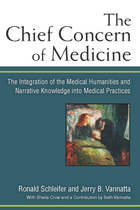
Unlike any existing studies of the medical humanities, The Chief Concern of Medicine brings to the examination of medical practices a thorough---and clearly articulated---exposition of the nature of narrative. The book builds on the work of linguistics, semiotics, narratology, and discourse theory and examines numerous literary works and narrative "vignettes" of medical problems, situations, and encounters. Throughout, the book presents usable expositions of the ways storytelling organizes itself to allow physicians and other healthcare workers (and even patients themselves) to be more attentive to and self-conscious about the information---the "narrative knowledge"---of the patient's story.
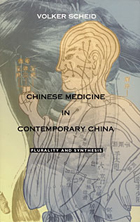
Scheid, a medical anthropologist and practitioner of Chinese medicine in practice since 1983, has produced an ethnography that accepts plurality as an intrinsic and nonreducible aspect of medical practice. It has been widely noted that a patient visiting ten different practitioners of Chinese medicine may receive ten different prescriptions for the same complaint, yet many of these various treatments may be effective. In attempting to illuminate the plurality in Chinese medical practice, Scheid redefines-and in some cases abandons-traditional anthropological concepts such as tradition, culture, and practice in favor of approaches from disciplines such as science and technology studies, social psychology, and Chinese philosophy. As a result, his book sheds light not only on Chinese medicine but also on the Western academic traditions used to examine it and presents us with new perspectives from which to deliberate the future of Chinese medicine in a global context.
Chinese Medicine in Contemporary China is the product of two decades of research including numerous interviews and case studies. It will appeal to a western academic audience as well as practitioners of Chinese medicine and other interested medical professionals, including those from western biomedicine.
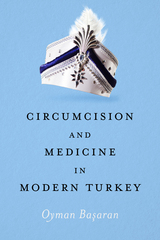
An investigation of how the expansion of modern medicine in Turkey transformed young boys’ experiences of circumcision.
In Turkey, circumcision is viewed as both a religious obligation and a rite of passage for young boys, as communities celebrate the ritual through gatherings, gifts, and special outfits. Yet the procedure is a potentially painful and traumatic ordeal. With the expansion of modern medicine, the social position of sünnetçi (male circumcisers) became subject to the institutional arrangements of Turkey’s evolving health care and welfare system. In the transition from traditional itinerant circumcisers to low-ranking health officers in the 1960s and hospital doctors in the 1990s, the medicalization of male circumcision has become entangled with state formation, market fetishism, and class inequalities.
Based on Oyman Başaran’s extensive ethnographic and historical research, Circumcision and Medicine in Modern Turkey is a close examination of the socioreligious practice of circumcision in twenty-five cities and their outlying towns and villages in Turkey. By analyzing the changing subjectivity of medical actors who seek to alleviate suffering in male circumcision, Başaran offers a psychoanalytically informed alternate approach to the standard sociological arguments surrounding medicalization and male circumcision.
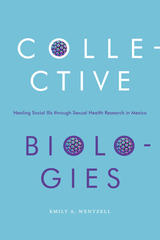
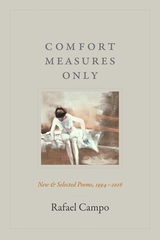
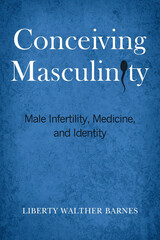
In Conceiving Masculinity, Liberty Walther Barnes puts the world of male infertility under the microscope to examine how culturally pervasive notions of gender shape our understanding of disease, and how disease impacts our personal ideas about gender.
Taking readers inside male infertility clinics, and interviewing doctors and couples dealing with male infertility, Barnes provides a rich account of the social aspects of the confusing and frustrating diagnosis of infertility. She explains why men resist a stigmatizing label like "infertile," and how men with poor fertility redefine for themselves what it means to be manly and masculine in a society that prizes male virility. Conceiving Masculinity also details how and why men embrace medical technologies and treatment for infertility.
Broaching a socially taboo topic, Barnes emphasizes that infertility is not just a women's issue. She shows how gender and disease are socially constructed within social institutions and by individuals.

As David Kelly writes, "Catholic moral theology has not been completely constant over the centuries; it has learned and developed." In Contemporary Catholic Health Care Ethics he demonstrates how Catholic health care ethics can—and should—evolve similarly in response to the lightning speed of modern medical advances. Kelly draws on and analyzes the Catholic tradition of medical ethics—but he does not shy away from criticizing it as well, giving health care professionals, hospital ethics committees, and students a fresh treatment of Catholic health care ethics emphasizing theology, methodology, and application.
First discussing the Catholic understanding of the human person, Kelly proposes a Catholic Christian approach to the meaning of human life as it applies specifically to health care. He includes a brief history of the relationship between religion and medicine, and makes strong claims about how theology ought and ought not to be applied in health care ethics. Drawing from the terminology and approaches used by secular bioethics, he suggests how a Catholic perspective on health care can utilize certain secular moral-philosophical positions, even as they apply to the issues of birth control, and end-of life concerns. As practitioners, patients, and families face the difficult decision to continue or stop treatment for dying patients, Kelly compassionately, but practically, explores their concerns in light of American law and ethics. Finally, he provides measured insight on pain management, hospital ethics committees, stem cell research, genetic engineering, and allocation of health care resources.
Contemporary Catholic Health Care Ethics is informed, challenging, articulate, and bold—bringing to the extremely important field of Catholic health care ethics a much-needed and welcome voice, unafraid to speak to the most difficult issues of the 21st century.
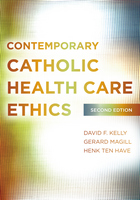
Contemporary Catholic Health Care Ethics, Second Edition, integrates theology, methodology, and practical application into a detailed and practical examination of the bioethical issues that confront students, scholars, and practitioners. Noted bioethicists Gerard Magill, Henk ten Have, and David F. Kelly contribute diverse backgrounds and experience that inform the richness of new material covered in this second edition.
The book is organized into three sections: theology (basic issues underlying Catholic thought), methodology (how Catholic theology approaches moral issues, including birth control), and applications to current issues. New chapters discuss controversial end-of-life issues such as forgoing treatment, killing versus allowing patients to die, ways to handle decisions for incompetent patients, advance directives, and physician-assisted suicide. Unlike anthologies, the coherent text offers a consistent method in order to provide students, scholars, and practitioners with an understanding of ethical dilemmas as well as concrete examples to assist in the difficult decisions they must make on an everyday basis.
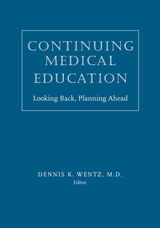
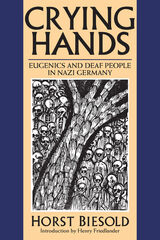
When the Nazis assumed power in Germany in 1933, they wasted no time in implementing their radical policies, first by securing passage of the Law for the Prevention of Offspring with Hereditary Diseases. Among those designated by this law as “congenitally disabled” were deaf people. Horst Biesold’s newly translated book examines this neglected aspect of Nazi “racial hygiene” through interviews with more than 1,000 deaf survivors of this brutal law that authorized forced sterilizations, abortions, and eventually murder.
Crying Hands meticulously delineates the antecedents of Nazi eugenics, beginning with Social Darwinism (postulated in the mid-nineteenth century) and tracing the various sterilization laws later initiated throughout the world, including many passed and practiced in the United States. This exceptional scholarship is movingly paralleled by the human faces fixed to the numbing statistics, as in story after story those affected recount their irretrievable loss, pain, and misplaced shame imposed upon them by the Nazi regime. Through their stories, told to Biesold in German Sign Language, they have given voice to the countless others who died from the specious science practiced by the Third Reich. And now their own trials have finally been acknowledged.
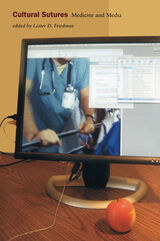
In this volume, scholars of cinema studies, philosophy, English, sociology, health-care education, women’s studies, bioethics, and other fields demonstrate how the world of medicine engages and permeates the media that surround us. Whether examining the press coverage of the Jack Kevorkian–euthanasia controversy; pondering questions about accessibility, accountability, and professionalism raised by such films as Awakenings, The Doctor, and Lorenzo’s Oil; analyzing the depiction of doctors, patients, and medicine on E.R. and Chicago Hope; or considering the ways in which digital technologies have redefined the medical body, these essays are consistently illuminating and provocative.
Contributors. Arthur Caplan, Tod Chambers, Stephanie Clark-Brown, Marc R. Cohen, Kelly A. Cole, Lucy Fischer, Lester D. Friedman, Joy V. Fuqua, Sander L. Gilman, Norbert Goldfield, Joel Howell, Therese Jones, Timothy Lenoir, Gregory Makoul, Marilyn Chandler McEntyre, Faith McLellan, Jonathan M. Metzl, Christie Milliken, Martin F. Norden, Kirsten Ostherr, Limor Peer, Audrey Shafer, Joseph Turow, Greg VandeKieft, Otto F. Wahl

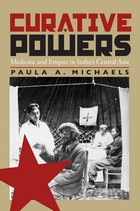
Finalist, PEN Center USA Literary Awards, Research Nonfiction
Rich in oil and strategically located between Russia and China, Kazakhstan is one of the most economically and geopolitically important of the so-called Newly Independent States that emerged after the USSR's collapse. Yet little is known in the West about the region's turbulent history under Soviet rule, particularly how the regime asserted colonial dominion over the Kazakhs and other ethnic minorities.
Grappling directly with the issue of Soviet colonialism, Curative Powers offers an in-depth exploration of this dramatic, bloody, and transformative era in Kazakhstan's history. Paula Michaels reconstructs the Soviet government's use of medical and public health policies to change the society, politics, and culture of its outlying regions. At first glance the Soviets' drive to modernize medicine in Kazakhstan seems an altruistic effort to improve quality of life. Yet, as Michaels reveals, beneath the surface lies a story of power, legitimacy, and control. The Communist regime used biomedicine to reshape the function, self-perception, and practices of both doctors and patients, just as it did through education, the arts, the military, the family, and other institutions.
Paying particular attention to the Kazakhs' ethnomedical customs, Soviet authorities designed public health initiatives to teach the local populace that their traditional medical practices were backward, even dangerous, and that they themselves were dirty and diseased. Through poster art, newsreels, public speeches, and other forms of propaganda, Communist authorities used the power of language to demonstrate Soviet might and undermine the power of local ethnomedical practitioners, while moving the region toward what the Soviet state defined as civilization and political enlightenment.
As Michaels demonstrates, Kazakhs responded in unexpected ways to the institutionalization of this new pan-Soviet culture. Ethnomedical customs surreptitiously lived on, despite direct, sometimes violent, attacks by state authorities. While Communist officials hoped to exterminate all remnants of traditional healing practices, Michaels points to evidence that suggests the Kazakhs continued to rely on ethnomedicine even as they were utilizing the services of biomedical doctors, nurses, and midwives. The picture that ultimately emerges is much different from what the Soviets must have imagined. The disparate medical systems were not in open conflict, but instead both indigenous and alien practices worked side by side, becoming integrated into daily life.
Combining colonial and postcolonial theory with intensive archival and ethnographic research, Curative Powers offers a detailed view of Soviet medical initiatives and their underlying political and social implications and impact on Kazakh society. Michaels also endeavors to link biomedical policies and practices to broader questions of pan-Soviet identity formation and colonial control in the non-Russian periphery.
READERS
Browse our collection.
PUBLISHERS
See BiblioVault's publisher services.
STUDENT SERVICES
Files for college accessibility offices.
UChicago Accessibility Resources
home | accessibility | search | about | contact us
BiblioVault ® 2001 - 2024
The University of Chicago Press


